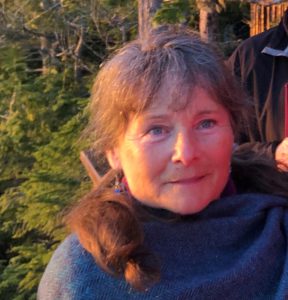Sandra Slobodian

Esquimalt, Colombie-Britannique
Participante au projet BC Generations depuis 2008
Selon vous, quels sont les problèmes les plus importants pour la santé des Canadiens?
Je pense que le cancer est le plus important problème de santé, et je suis préoccupée par la réglementation des aliments, notamment les organismes génétiquement modifiés (OGM) et le poisson d’élevage.
Pourquoi avez-vous décidé de vous impliquer dans le projet BC Generations?
J’espérais pouvoir aider à la recherche et comme ma famille est métisse, j’ai pensé que cela pouvait être important. Par définition, les Métis sont un mélange d’Européens et d’Autochtones, et les variations dans nos données collectives pourraient être intéressantes et utiles [pour les chercheurs].
Je suis Métisse par ma mère. La mère de ma mère venait de la région de l’Athabasca du côté de sa mère et de la colonie de la rivière Rouge du côté de son père. Le père de ma mère était originaire de la colonie de la rivière Rouge depuis trois générations et, auparavant, sa famille venait du Québec et de la Nouvelle-Écosse.
La mère de mon père était allemande et son père était irlandais.
Je pense que les membres de nombreuses Premières Nations sont une excellente source d’information générationnelle, mais ils peuvent hésiter à participer à des projets de recherche parce beaucoup ont été sur-étudiés ou ont subi des abus en raison des politiques gouvernementales et pourraient se méfier du processus.
J’ai souvent pensé que, dans l’optique de l’histoire de l’humanité, les peuples autochtones n’ont pas été exposés aux maladies et au régime alimentaire des Occidentaux pendant une longue période et peuvent encore souffrir – sans toutefois y succomber – de la petite vérole [et d’autres maladies].
Avez-vous vécu une expérience personnelle avec le cancer ou d’autres maladies chroniques?
Ma mère, mon père, ma sœur et ma fille ont tous été atteints du cancer.
Si vous pouviez changer une chose concernant les soins de santé dans votre collectivité, qu’est-ce que ce serait?
L’innovation dans les cliniques communautaires – telles que les soins prolongés et les approches alternatives en matière de santé – pourrait inciter davantage de gens à se lancer en médecine générale.
Mon mari était médecin et a participé au Projet communautaire de la Baie James à Victoria, un projet révolutionnaire où les familles, les jeunes, les aînés et les autres membres de la communauté trouvent le soutien dont ils ont besoin.
Que diriez-vous à un autre Canadien qui envisage de participer au Projet de partenariat canadien Espoir pour demain?
Les études de ce genre sur les mégadonnées sont un moyen de découvrir des solutions cachées aux problèmes de santé.
Nous ne savons pas vraiment à quel point l’alimentation, l’exercice, l’environnement et d’autres facteurs sont au cœur des problèmes de santé, et je pense que nous avons besoin de plus de données pour nous aider à mieux vivre et à contrer les modes (en matière de santé) et [notre] dépendance envers les solutions chimiques.